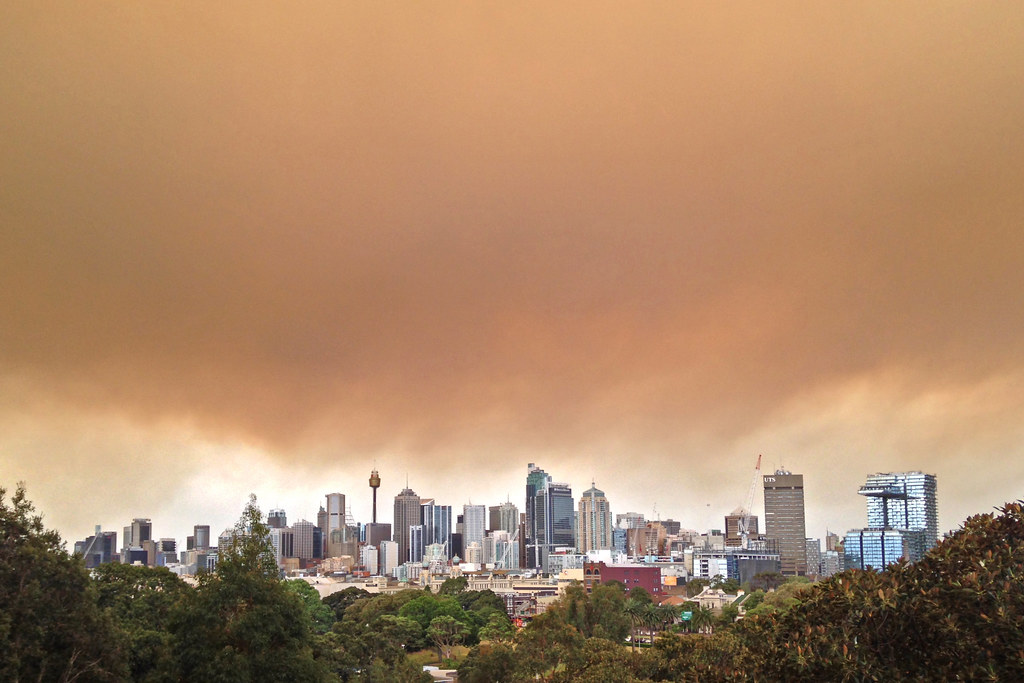
Where climate emergency and the housing crisis intersect, local speakers weigh in

Image: Sydney skyline covered in smoke from bushfires. Photo: Flickr.
By CHRISTINE LAI
Local communities are beginning to tackle the idea that the crises Sydney residents face today aren’t independent of each other.
This week a panel of community leaders joined to discuss how housing and climate intersect, and posed some solutions designed for public benefit. Speakers discussed the need to solve these issues immediately as parts of the world become uninhabitable, and people are forced to endure the continual cost-of-living crisis.
Executive Director and Founder at Sweltering Cities Emma Bacon described the increased community interest in discussing the lived experiences of climate change, “not as a cognitive insurance premium but in how we’re currently experiencing the impacts (floods, fires, storms, heatwaves)”.

Sweltering Cities is a non-for-profit geared at helping communities impacted by extreme heat. Bacon says her work has highlighted how economic disparity affects communities who experience the effects of climate emergency on their front doorstep.
She said people are often told to “put wet towels on the back of their necks or turn on the air conditioner” when faced with rising temperatures.
“[This] fails to recognise the structural inequalities that drive vulnerability to heat- an issue that is happening to tens of thousands of people across the country” Bacon said.
Bacon also clarified the need to resolve the climate crisis and heat waves by meeting it with services and regulations; increased health services that meet the advice of reports like the Emissions Gas Report.
The danger of continual temperature increases
“Places like Penrith will see on average, 2 months a year over 35 degrees, and 2 weeks over 40. Anything over 35 is classified as extreme heat and those temperatures mean infrastructure breaks, exacerbates health conditions, and has detrimental impacts on our mental health”, Bacon said.
The intersection of the cost-of-living-crisis and economic crisis was exemplified in the ‘silent killer’ of heat waves.
Bacon criticised the “vast underestimation of the health impacts from extreme heat” in the health system and raised concerns of patients who are first admitted and presenting with a respiratory illness without changes by the state being done to protect the health of the local community and to prevent future hospitalisations.
Waterloo Estate demolition to produce emissions

Waterloo resident Karyn Brown condemned the government’s redevelopment proposal of a large block of social housing in Waterloo. The rezoning of Waterloo South will force the eviction of hundreds to demolish 749 public homes.
“When we know is that it’s criminal to demolish 19 hectares of building, that is perfectly good for people in paid work to live in public housing,” Brown said.
“Rather than maintaining those homes and retrofitting them to make them more climate sustainable, they’ve decided on extra carbon emissions going into constructing new urban planning.”
Both speakers declared that it was time for people to recognise the links between the housing and climate crisis, and to centre the focus on dramatically reducing emissions, finding other methods to be more sustainable and building accessibility and public housing for local communities.
“The two main profit models currently are redeveloping small bits of land with high value housing offices, or rezoning city fringe to deforestation. Housing involves value-based planning and the only one currently in the system is based on profit”, Bacon said.
Issues with the current model of social welfare
Dr Alex Baumann, a lecturer in Sustainable Futures at Western Sydney University described the history of colonisation as deeply interwoven into the housing crisis that Sydney currently faces.
Through the lens of the social science framework, Dr Baumann emphasised the need to think critically outside the notion of housing and work, stating that the way constructing public housing is viewed “under neoliberalism carries the idea of a dependency for those who haven’t succeeded in core ingredients of market capitalism: private housing and paid work.”

Dr Baumann referenced the United Nations Environment Programme (UNEP) Emissions Gas Report that was released this year which calls for a “rapid transformation of societies” in response to the climate crisis.
In the Emissions Gas Report, the UNEP states that since the last United Nations Climate Change Conference (COP26) in Glasgow new and updated nationally determined contributions (NDCs) have “barely impacted the temperatures we can expect to see at the end of this century”.
He asserted a need to stop “growing our economy” while also reducing production and consumption that the “developed world is responsible for” to combat rising temperatures and increased gas emissions.
“Privatisation has locked us into needing market and growth opportunities, which has led to a Catch 22. A growth model takes us off an ecological cliff. What we need is to find ways to give people housing and work that don’t rely on growth of markets”, Dr Baumann said.
The practical way forward
One of the models that was introduced by Dr Baumann in response to the housing and climate crisis involved his latest project, the Neighbourhood That Works (NTW).
The NTW’s core project proposes “an alternative way for people to meet some of their own housing, food and other basic needs – while helping to make their neighbourhood work”.
The NTW offers an alternative space which, in ecological terms, provides a form of development that isn’t reliant on market growth potential. The project involves voluntary community work as an approved income test with a commitment to 15 hours of weekly participation in the neighbourhood.
This project would “transcend the binary where you’re in private housing and paid work or welfare dependent” Dr Baumann said.









